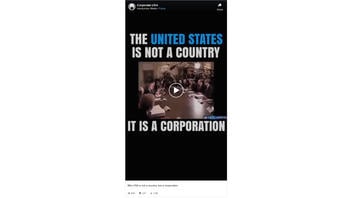
Is the United States a corporation in the way General Motors is? Is the president the head of a corporation called the United States of America? And are African Americans emancipated but not free? No, none of that is true: this conspiracy theory makes claims based on selection of only one of the several definitions of the word "incorporated" and of the word "president." The claim requires a reading of the 14th Amendment and the Emancipation Proclamation that is not supported in the day-to-day functioning of the U.S. government as recognized and approved in hundreds of years of case law and daily life in the United States.
The claim appears in a video (archived here) posted to Facebook on February 9, 2021, under the title "Why USA is not a country, but a corporation." It opened:
The United States is not a country. It is a corporation... Countries don't have presidents, corporations do...The United States of America is no different than General Motors of Detroit or Sears and Roebuck of Chicago.
This is what the post looked like on Facebook at the time of writing:
(Source: Facebook screenshot taken on Thu Feb 11 19:21:49 2021 UTC)
In a February 17, 2021, phone interview with Lead Stories, University of Washington Law School constitutional law professor Jeff Feldman said "incorporation" is a word with several distinct definitions that clearly mean different things for for-profit companies, incorporated non-profit organizations and for incorporated governments -- and that does not make the U.S.A. a corporation like General Motors.
When the original British colonies (some of which were indeed chartered trading companies) broke free of England, they abandoned the king's charters and re-incorporated as individual governments. "If you wanted to be hyper-technical about it, you could say the United States was formed as a consequence of the merger of 13 colonial corporations," Feldman said. But that doesn't make the U.S. a private corporation like GM, he said.
The video narrator's assertion that only corporations have presidents doesn't square with widely available information. There are dozens of nations, including the U.S., with a constitutionally-defined office called "president." Corporate governance has no monopoly on the title, which is used in describing the executive branch in Article II of the U.S. Constitution.
The narrator's claims about African Americans' citizenship and freedom are based on a citation from a legal encyclopedia (Volume 20, Corpus Juris Secondum 1785) from which he draws old case law that found "The United States government is a foreign corporation with respect to a state." Using that, the narrator argues that "You are not an American. You are legally a citizen living in a foreign state."
Feldman said the narrator has that backwards. States, he points out, don't issue passports. When a person renounces their citizenship to secure citizenship of another country, they don't renounce any state citizenship, they renounce their rights as a U.S. citizen. The narrator's reliance on the Corpus Juris Secondum encyclopedia, which Feldman said is not often used as a case-building source of legal citations, likely ignores the origin of that quote: "Basically, a foreign corporation is any corporation that is not a domestic corporation, meaning it's not incorporated in the state."
The narrator's reading of the 14th Amendment as a further enslavement of African Americans flies in the face of its plain wording, of U.S. history, case law and daily practice. The 14th Amendment guaranteed freed slaves, emancipated by President Abraham Lincoln, the same rights as all other Americans. The 13th amendment codified the emancipation proclamation.
The narrator says: "What the owners who owned those slaves did was transfer their property, which were the slaves, from the slave owner to the United State government under the 14th amendment...What that means for black folks is this. You are not free, you are what is called emancipated and emancipation is not freedom. Emancipation is the transfer of property from one owner to another owner."
The legal terms dictionary on The Law.com does not differ in substance from The Merriam-Webster Dictionary definition of emancipate:
1: to free from restraint, control, or the power of anotherespecially : to free from bondage
2: to release from parental care and responsibility and make sui juris
3: to free from any controlling influence (such as traditional mores or beliefs)


















